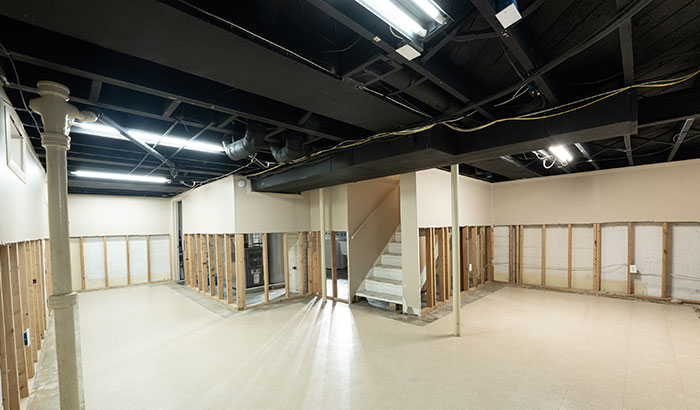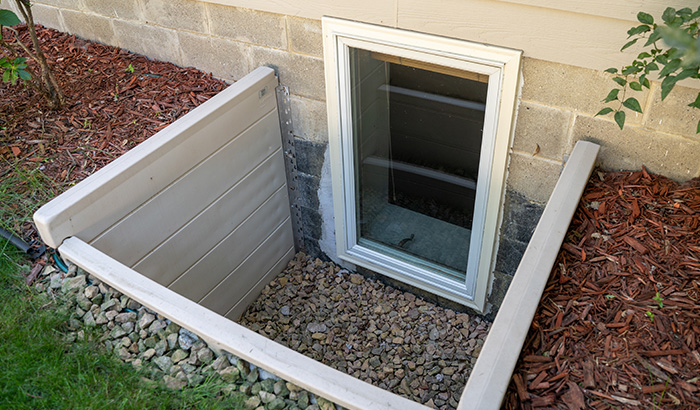Basement maintenance may not be at the top of your to-do list, but it’s important to address it at least once a year. Doing so can help to make sure your home stays safe and secure.
It can be easy to overlook the basement, especially if it is not consistently used as living space or has been designated as storage space. But even if you regularly use your basement, there are many parts that might not stand out in need of maintenance.
So what does basement maintenance entail? Well, many factors – weather, climate, whether your basement is finished, and the age of your home – can impact what you should do with your basement. But ultimately, your basement should be kept dry and well-insulated.
No matter what condition your basement is in, here are five tips to help you maintain your basement and prevent damages or other complications as a homeowner.
- Insulation
Insulating your home properly can not only make your home more comfortable, but it can save you money on the costs of heating and cooling. Heat will naturally flow to balance out the temperature of a specific space, including the items in that space.
There are three main processes of heating:
- Convection – when heat flows through gases or sometimes liquids
- Example: A hot air balloon creates a convection current because the cooler air on the outside of the balloon is heavier and forces the lighter heated air inside the balloon upwards.
- Conduction — when heat flows through a substance
- Example: You are walking on hot sand with bare feet, and your feet get burned.
- Radiation — when heat moves out from a heat source and is absorbed by anything in its path
- Example: You feel the heat of the sun on your face.
Insulation creates resistance to heat flow. Most insulation products used in your home slow or impede the flow of heat via conduction and convection. So in the winter, insulation keeps the heat inside your home, and in the summer, it keeps the heat outside of your home.
An average of 20 percent of the heat in your home is lost through the basement if it is not well insulated. Part of finishing and maintaining your basement is ensuring the floors, walls, and ceilings are protected with the right materials and installation. Insulating your basement is a great way to add comfort, energy efficiency, and value to your home.
It is also essential to insulate the pipes that run through the walls. If the water that runs through the pipes is colder than the temperature inside the basement, then condensation will collect on the pipes. This moisture has nowhere to go, so it becomes a hazard for water damage, which is the last thing you want in your basement.
- Laundry Machines and Ventilation
Many homes have washer and dryer hook-ups in the basement. This isn’t necessarily a problem as long as the machines are working properly and the correct ventilation is in place.
When inspecting your washing machine, ensure all the seals are secure, and the electrical wiring is still covered and working as it should. Dryers are more often in need of maintenance and should be inspected regularly to ensure the lint filter is clear, and the air has a clear pathway to the exterior of your home.
If you have to dry clothes without a machine, don’t hang them to dry in your basement. As the clothes dry, the moisture stays in the basement, and excess moisture increases the risk of mold. Clothes that need to hang or air dry should be taken outside, if weather permits, or in a well-ventilated space upstairs.
- Check On Storage
Even with a finished basement, there is usually some space in a basement that is dedicated to storage. This could be all the camping gear, food storage, outgrown clothes, your dad’s old atari game collection, or any variety of different items. Whatever is being stored should be checked regularly as part of basement maintenance.
Cardboard boxes can be a handy and inexpensive way to store things, but cardboard can absorb moisture and provide protection and food for pests. Instead, keep all items in airtight containers, such as plastic bins with tight lids or vacuum-sealed bags.
Any cleaning, camping, or construction materials that may be flammable or leak fluids should be stored safely and inspected to ensure they are not near a heat source or likely to leak unnoticed.
- Water-Resistant Paint
As we’ve previously mentioned, excess moisture can cause problems to the structure and security of your basement. In addition to keeping as much water out of your basement as possible, some preventative measures can be taken as part of basement maintenance.
If your basement is finished, it’s a good idea to ensure that the paint used for the walls and ceilings is water-resistant. Even if the drywall is not complete, you can still apply a layer of water-resistant paint as a precaution until the basement is finished. Some paints even have additional mold-resistance qualities.
- Window Wells and Downspouts
The last step of basement maintenance is to inspect your window wells. While window wells provide natural light for your basement, they also are an essential part of the draining system of your home. Whenever rain or snow falls, window wells help ensure that water drains away from your home’s foundation and prevents flooding or water damage.
Other essential pieces of the draining system of your home are the gutters on your roof and the downspouts that allow water to follow the best pathway to drain away from your home. Even though the gutters and downspouts are not part of your basement, taking care of them is part of basement maintenance, and here’s why.
If a gutter on your roof becomes clogged, water will not be able to reach the downspout and will flow over the side of your house and collect on the ground. Depending on where the water collects, this can lead to flooding and water damage in your basement or other areas of your home. The same is true if the downspout becomes clogged or displaced.
While window wells can facilitate draining, they also require seasonal maintenance to stay in working order. Taking some time each spring and autumn to inspect, clean, and fix any issues with your window wells can save you time and money in the long run, especially if a disaster occurs unexpectedly.
Improve the Functionality and Beauty of Your Basement
Windowell Expressions has provided care and products for window wells for over 25 years and is dedicated to customer satisfaction. The window well liners, covers, grates, and other products are guaranteed to add protection to your basement and improve the function of your window wells with style and appealing solutions.
Get your free estimate today!







